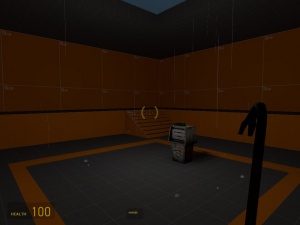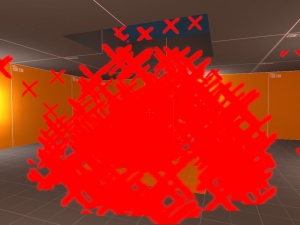Rain splashes: Difference between revisions
m (→Source Code) |
Bloodhound (talk | contribs) m (fixed the code box) |
||
| Line 10: | Line 10: | ||
First, replace line 36 in c_effects.cpp with the following code. | First, replace line 36 in c_effects.cpp with the following code. | ||
ConVar r_RainSplashPercentage( "r_RainSplashPercentage", "99", FCVAR_CHEAT ); // N% chance of a rain particle making a splash. | ConVar r_RainSplashPercentage( "r_RainSplashPercentage", "99", FCVAR_CHEAT ); // N% chance of a rain particle making a splash. | ||
Now, simply the function at line 295 with the following code: | Now, simply the function at line 295 with the following code: | ||
Revision as of 08:20, 15 September 2011
Requirements
You must be using the Source 2007 engine for this to work. You also need to have a pre-made splash particle system.
Source Code
By default the rain splashes done in c_effects.cpp in the Simulate Rain function take place 20% of the time, and more importantly, only on water. This snippet will allow the rain to work on almost all surfaces, including static props, and also allows for a custom rain splash particle effect.
First, replace line 36 in c_effects.cpp with the following code.
ConVar r_RainSplashPercentage( "r_RainSplashPercentage", "99", FCVAR_CHEAT ); // N% chance of a rain particle making a splash.
Now, simply the function at line 295 with the following code:
Code provided by Tony Sergi
inline bool CClient_Precipitation::SimulateRain( CPrecipitationParticle* pParticle, float dt )
{
if (GetRemainingLifetime( pParticle ) < 0.0f)
return false;
Vector vOldPos = pParticle->m_Pos;
// Update position
VectorMA( pParticle->m_Pos, dt, pParticle->m_Velocity,
pParticle->m_Pos );
// wind blows rain around
for ( int i = 0 ; i < 2 ; i++ )
{
if ( pParticle->m_Velocity[i] < s_WindVector[i] )
{
pParticle->m_Velocity[i] += ( 5 / pParticle->m_Mass );
// clamp
if ( pParticle->m_Velocity[i] > s_WindVector[i] )
pParticle->m_Velocity[i] = s_WindVector[i];
}
else if (pParticle->m_Velocity[i] > s_WindVector[i] )
{
pParticle->m_Velocity[i] -= ( 5 / pParticle->m_Mass );
// clamp.
if ( pParticle->m_Velocity[i] < s_WindVector[i] )
pParticle->m_Velocity[i] = s_WindVector[i];
}
}
/*
// No longer in the air? punt.
if ( !IsInAir( pParticle->m_Pos ) )
{
// Possibly make a splash if we hit a water surface and it's in front of the view.
if ( m_Splashes.Count() < 20 )
{
if ( RandomInt( 0, 100 ) < r_RainSplashPercentage.GetInt() )
{
trace_t trace;
UTIL_TraceLine(vOldPos, pParticle->m_Pos, MASK_WATER, NULL, C COLLISION_GROUP_NONE, &trace);
if( trace.fraction < 1 )
{
m_Splashes.AddToTail( trace.endpos );
}
}
}
// Tell the framework it's time to remove the particle from the list
return false;
}*/
/*Tony; the traceline replaces the IsInAir check.
you also don't want the random's to be around the traceline either, or it will only check SOMETIMES. it needs to check _all_ the time.
you also probably want to do some radius checking of the particles position (ignoring z) for if it's in range of the local player to run this code or not
otherwise you will have traces for every particle all over the place even if there's no way that the player can see it
so when the player is out of that radius, you would only use if ( !IsInAir( pParticle->m_Pos ) { return false; }
probably also need to check to make sure that it doesn't splash on sky, too.
*/
trace_t trace;
UTIL_TraceLine(vOldPos, pParticle->m_Pos, MASK_SOLID_BRUSHONLY, this, COLLISION_GROUP_NONE, &trace);
if( trace.fraction < 1 || trace.DidHit() )
{
if ( RandomInt( 0, 100 ) <= r_RainSplashPercentage.GetInt() )
DispatchParticleEffect( "SPLASH_PARTICLE_NAME", trace.endpos,trace.m_pEnt->GetAbsAngles() , NULL );
// Tell the framework it's time to remove the particle from the list
return false;
}
// We still want this particle
return true;
}
NOTE: REPLACE SPLASH_PARTICLE_NAME WITH YOUR PARTICLE SYSTEM
Particle Setup
The only specifications needed for your splash particle are that it be precached (See Particles_manifest.txt), and that it has "Constrain distance between control points" in the Constraints section of your particle.

